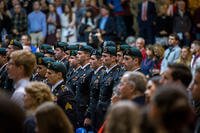History books highlight the Marshall Plan under international relations, but long before George Catlett Marshall was a statesman, he was a soldier. As chief of staff during World War II, Marshall built and directed the largest army in history.
He had had practice for this monumental task in his earlier service. The 1901 Virginia Military Institute graduate served in many World War I battles, including Cantigny, Aisne-Mare, and St. Mihiel.
It was during the action at Meuse-Argonne that the 37-year-old major managed the most outstanding large-scale troop movement of the war. He shifted 500,00 troops and 2,700 guns so successfully that it took the Germans 24 hours to realize what had happened.
Marshall finished out the war as Gen. John Pershing's aide-de-camp, and served in a variety of locales and in positions of increasing importance until his appointment as Army chief of staff in 1939. He was the first non-West Point graduate in that position since 1914, but he soon made the office his own by his analytical mind and even temperament. Still, he was firm and decisive. "A sure way to anger George Marshall is to ask him to change his mind once he has made it up," a journalist wrote in 1939.
In naming him "Man of the Year" for 1943, Time magazine said that "American democracy is the stuff Marshall is made of. . .[he is] the civis Americanus." Marshall hated war, and focused his high integrity and competence on creating peace rather than personal glory. His 1943 summary of military operations was written without a single use of the first-person pronoun, and his was said to be the one voice President Franklin Roosevelt turned to for edification rather than affirmation.
With the war won, Marshall resigned as a five-star general. He became secretary of state in 1947 and spent his two years in office crafting his famous plan to rebuild and strengthen Western Europe. Winston Churchill called him "the true architect of victory" for England and the Continent.
Marshall also had a vital role in the creation of NATO, and served as secretary of defense from 1950-1951. A true internationalist, he won the 1953 Nobel Peace Prize. Yet such was his military dedication and bearing that Henry Stimson told him, "I have seen a great many soldiers in my day and you, sir, are the finest soldier I have ever known."
Related links:















